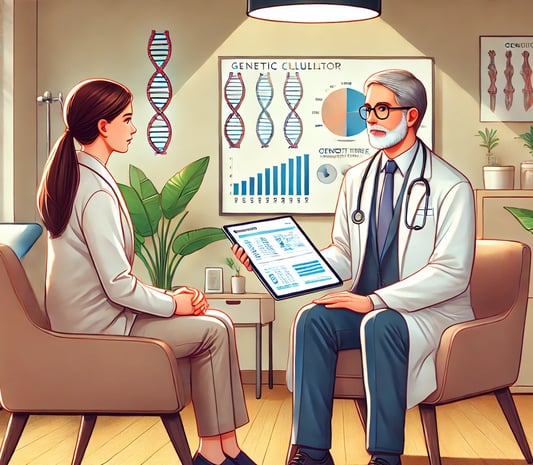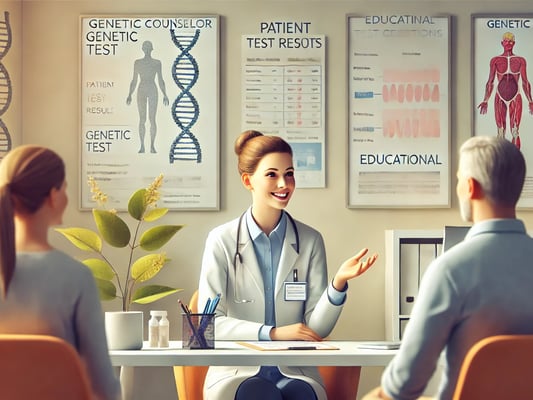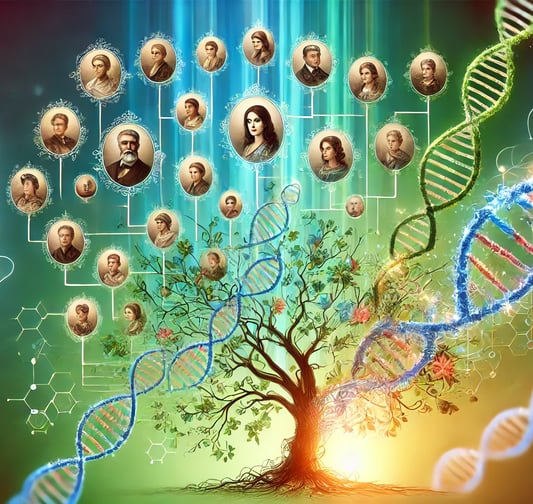How to Stand Out in The Genetic Counseling Program Application Process
Looking to apply to a genetic counseling program? Discover the key academic requirements, relevant experiences, and personal qualities that top programs seek in applicants. This comprehensive guide offers insights on how to build a competitive application, from gaining clinical experience and shadowing genetic counselors to crafting a standout personal statement and acing your interview. Get ready to make your application shine in this highly competitive field!
CAREER ADVICEAPPLICATION HELPSCHOOL ADVICE


How to Stand Out in Highly Competitive Genetic Counseling Admissions Process
How to Stand Out in Highly Competitive Genetic Counseling Programs
Genetic counseling programs are among the most competitive in the healthcare field, seeking applicants who not only excel academically but also possess the relevant experience and personal qualities essential to succeed in this emotionally and intellectually demanding profession. If you're aiming to secure a spot in one of these programs, it's crucial to understand what admissions committees are looking for in a successful candidate.
Key Takeaways
Strong academic foundation in sciences like biology and genetics is essential.
Relevant experience, such as shadowing and clinical work, significantly boosts your application.
Personal qualities like empathy, communication skills, and cultural competence are highly valued.
Letters of recommendation and a well-crafted personal statement are crucial components of your application.
Interviews test your professionalism and your passion for genetic counseling.


Academic Background: The Foundation of Your Application
Strong Science Foundation
To succeed in a genetic counseling program, a robust academic background in the life sciences is non-negotiable. Admissions committees typically look for applicants who have completed undergraduate degrees in fields like biology, genetics, biochemistry, or related disciplines. Courses such as genetics, psychology, embryology, and statistics are not just recommended—they are often required. These courses provide the foundational knowledge necessary to grasp the complexities of genetic information and its implications.
Understanding the importance of a solid science background can help you tailor your undergraduate studies to meet these requirements. If you’re still exploring your educational options, consider looking into specific school profiles that align with your academic interests and career goals.


GPA: Striving for Excellence
A competitive GPA, often around 3.5 or higher, is generally expected by most programs. However, a slightly lower GPA can sometimes be offset by other strengths in your application, thanks to holistic review processes. These might include exceptional letters of recommendation, significant research experience, or compelling personal qualities that align with the demands of genetic counseling.
Holistic reviews allow admissions committees to consider the entirety of your application. This means that even if your GPA isn’t perfect, your dedication to the field and your relevant experiences could make all the difference. For a deeper understanding of how programs evaluate candidates, check out this guide on criteria used by genetic counseling programs to evaluate applicants.


Relevant Experience: Demonstrating Commitment and Understanding
Genetic Counseling Shadowing
Shadowing a genetic counselor is one of the most effective ways to demonstrate your commitment to the field. This experience offers invaluable insight into the daily responsibilities and challenges of the profession, allowing you to confirm that this is the right career path for you. Additionally, shadowing experience signals to admissions committees that you have a realistic understanding of the profession.
If you’re unsure how to start shadowing, explore resources on how to shadow a genetic counselor and questions to ask during your shadowing experience. These articles provide practical tips and questions that can help you make the most of your experience.


Clinical Experience
Hands-on clinical experience is another crucial component of a strong application. Whether through volunteering in hospitals, working as a medical assistant, or engaging in other patient-facing roles, clinical experience helps you develop essential skills like empathy, communication, and patient care. These are critical in genetic counseling, where the ability to connect with patients on a personal level is just as important as scientific knowledge.
Clinical experience is more than just a resume booster—it’s a vital aspect of your development as a future genetic counselor. By working closely with patients, you’ll gain insights into the healthcare environment and learn how to apply theoretical knowledge in real-world scenarios.
Research Experience
Involvement in genetics or related research projects is highly advantageous. It not only showcases your ability to engage in scientific inquiry and critical thinking but also demonstrates that you can handle the rigorous scientific aspects of genetic counseling. Whether you've worked in a lab, contributed to a research paper, or participated in a genetics-related project, this experience strengthens your application.
Research experience can also provide talking points during your interview, showing that you have a deep understanding of the scientific principles underlying genetic counseling. It’s an opportunity to demonstrate your intellectual curiosity and your ability to contribute to the field.




Advocacy or Counseling Experience
Experience in counseling, social work, or advocacy—such as working with support groups or crisis hotlines—is incredibly valuable. These roles help develop your ability to provide emotional support and understand complex personal situations, both of which are crucial in genetic counseling. This experience also highlights your commitment to helping others, a key aspect of the profession.
By engaging in advocacy or counseling, you’re not just building your resume—you’re developing the interpersonal skills that will make you an effective genetic counselor. This experience underscores your ability to support patients emotionally, which is as important as your technical knowledge.


Personal Qualities: What Makes You the Right Fit?
Empathy and Compassion
Empathy is at the heart of genetic counseling. The ability to understand and share the feelings of others is essential when working with individuals who are often facing challenging decisions or health concerns. Demonstrating empathy in your application, whether through your experiences or personal statement, can set you apart from other candidates.
Empathy is not just a buzzword—it’s a core skill that will define your interactions with patients. By highlighting your compassionate nature, you show admissions committees that you have the emotional intelligence necessary for this challenging field.
Communication Skills
Strong communication skills, both verbal and written, are non-negotiable in genetic counseling. You must be able to explain complex genetic information in a way that is understandable to patients and their families. Highlighting your communication skills in your application—perhaps through writing samples, interviews, or testimonials from supervisors—can greatly enhance your appeal to admissions committees.
Communication is the bridge between complex genetic data and patient understanding. Your ability to convey information clearly and compassionately will be crucial in your role as a genetic counselor.




Critical Thinking
Genetic counselors must analyze and synthesize genetic information, assess risks, and make informed recommendations. Your ability to think critically will be assessed through your academic work, research experience, and during interviews. Programs look for candidates who can demonstrate these skills in real-world scenarios.
Critical thinking is more than just problem-solving—it’s about making informed, ethical decisions that impact patient lives. Showcasing your ability to think critically will reassure admissions committees that you can handle the complexities of the profession.
Cultural Competence
As genetic counseling increasingly involves working with diverse populations, cultural competence is becoming ever more important. Your ability to understand and respect different cultural perspectives is vital in providing effective care. Experiences that demonstrate your cultural competence, such as working with diverse communities, should be highlighted in your application.
Cultural competence isn’t just about being aware of differences—it’s about actively respecting and integrating those differences into patient care. This skill will help you build trust and rapport with a diverse patient population.
Professionalism and Resilience
Professionalism, integrity, and the ability to work effectively in a team are key traits for genetic counselors, who often work in multidisciplinary settings. Additionally, resilience—the ability to cope with emotionally challenging situations while maintaining professional boundaries—is essential. These qualities can be demonstrated through your clinical and shadowing experiences, as well as through your personal statement and letters of recommendation.
Resilience is your ability to remain effective under pressure, a crucial trait in the emotionally demanding field of genetic counseling. Demonstrating professionalism and resilience shows that you’re prepared for the challenges of the role.






Letters of Recommendation: Strong Endorsements
Strong Endorsements
Programs typically seek letters of recommendation from individuals who can attest to your academic abilities, clinical experience, and personal qualities. Ideally, these letters should come from professionals who understand the genetic counseling field, such as a genetic counselor you shadowed or a professor who taught relevant courses. A well-rounded letter that speaks to your strengths in these areas can significantly bolster your application.
Letters of recommendation are more than just a formality—they’re a powerful endorsement of your readiness for the program. Make sure your recommenders understand your qualifications and your passion for genetic counseling.


Personal Statement: Your Chance to Shine
Clear Motivation
Your personal statement is your opportunity to articulate why you want to pursue genetic counseling. It should reflect a clear understanding of the profession and align with the specific values and mission of the program you're applying to. Use this space to connect your experiences, qualities, and academic background with your motivation for entering the field.
Your personal statement is your voice in the application process. It’s where you can truly express your passion for genetic counseling and make a compelling case for why you’re the right fit for the program.
Alignment with Program Values
Admissions committees look for applicants whose values align with those of their program. Research the programs you’re applying to and tailor your personal statement to reflect how your goals and values match theirs. This demonstrates not only your interest but also your dedication to finding the right fit.
By aligning your personal statement with the program’s values, you show that you’ve done your homework and are genuinely interested in what they have to offer.




Interviews: The Final Test
Professional Demeanor
During the interview, it's essential to exhibit professionalism, confidence, and a genuine passion for genetic counseling. Admissions committees are looking for candidates who not only have the right qualifications but also the right attitude and demeanor for the profession.
Your interview is your chance to make a lasting impression. Demonstrating professionalism and enthusiasm will help you stand out as a top candidate.
Reflective and Insightful Responses
Programs value candidates who can reflect on their experiences and articulate how those experiences have prepared them for a career in genetic counseling. Be prepared to discuss specific examples from your academic and professional life that demonstrate your readiness for the challenges of the program.
Insightful, reflective answers show that you’ve thoughtfully considered your path to genetic counseling and are prepared for the demands of the profession. For more interview tips, refer to how to ace your genetic counseling school interview.






